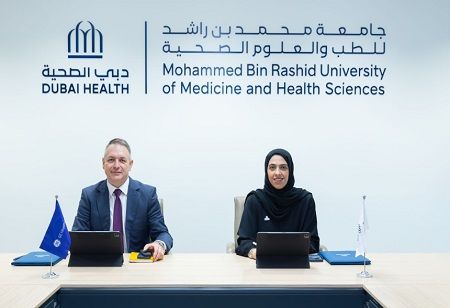- Dubai Health & GE HealthCare sign MoU to enhance POCUS education and co-develop AI solutions for better clinical outcomes across the MENA region.
- MBRU to become a Center of Excellence for Point-of-Care Ultrasound education under the new initiative.
- Collaboration to co-create AI tools in radiology and diagnostics via Dubai Health Innovations, boosting early detection and workflow automation.
Dubai Health and GE HealthCare, a world-leading medical technology and digital solutions pioneer, have entered into a Memorandum of Understanding (MoU) to join hands for improving Point-of-Care Ultrasound (POCUS) skills and co-developing cutting-edge artificial intelligence (AI)-based solutions to aid clinical decision-making, thereby improving patient care and outcomes in the UAE and the Middle East and North Africa (MENA) region.
The partnership leverages Dubai Health's innovation and academic capabilities with GE HealthCare's cutting-edge technological strength to bolster medical education, improve clinical decision-making, and advance health outcomes across the UAE and the wider MENA region.
The MoU will make Mohammed Bin Rashid University of Medicine and Health Sciences (MBRU) a Point-of-Care Ultrasound Education Centre of Excellence and a leader in Point-of-Care Ultrasound education in the MENA region.
Major initiatives are: a 'Train-of-Trainer (TOT)' formal program to develop capacity in accredited trainers and facilitators. The Facilitator Training Program will also increase the scalability and efficiency of POCUS program delivery and implementation to a wider geographical area, allowing for greater participation of attendees, students, and delegates.
Besides that, the partnership will also include the co-creation of AI solutions via Dubai Health Innovations, the accelerator for transformational solutions with a focus on improving patient care, advancing medical innovation, and health outcomes. The collaboration will work on the development and validation of new AI technologies in fields of common interest like radiology and computer vision that can enhance diagnostic accuracy, automate clinical workflow, and enable early detection of medical conditions. This collaborative effort by both parties is aimed at promoting innovation, accelerating the uptake of state-of-the-art AI tools, and advancing healthcare delivery in the region.

